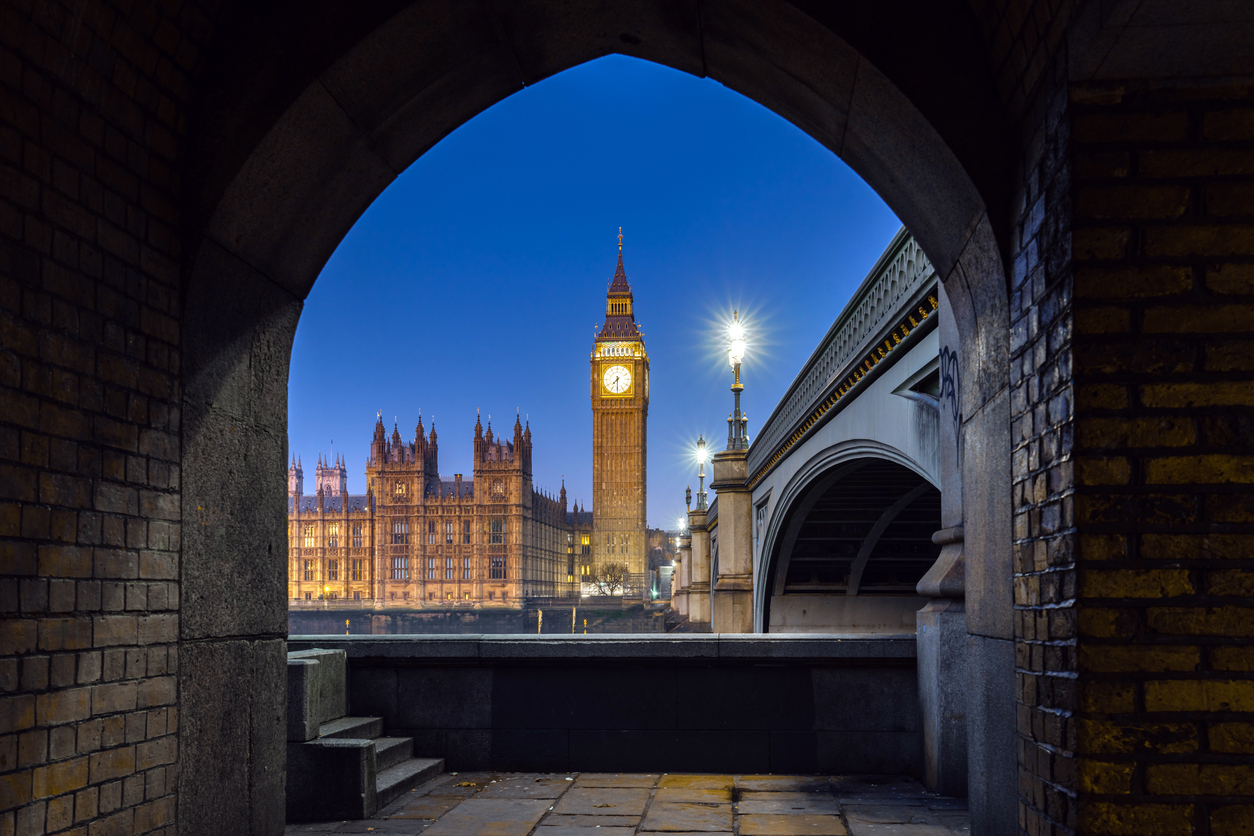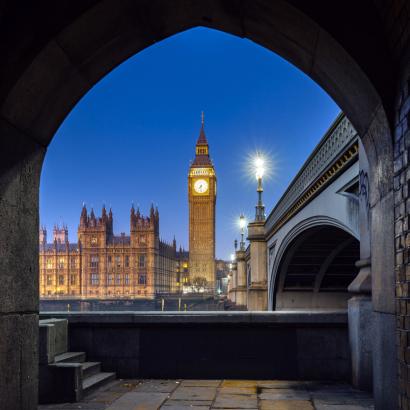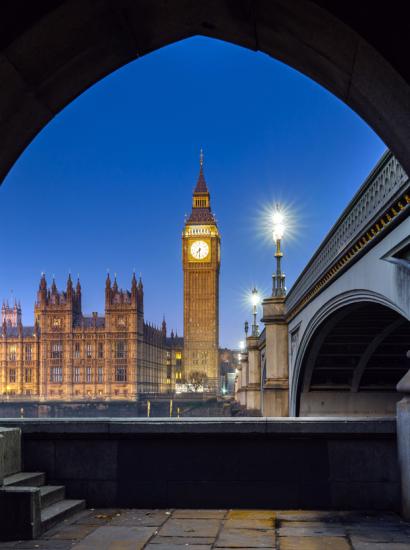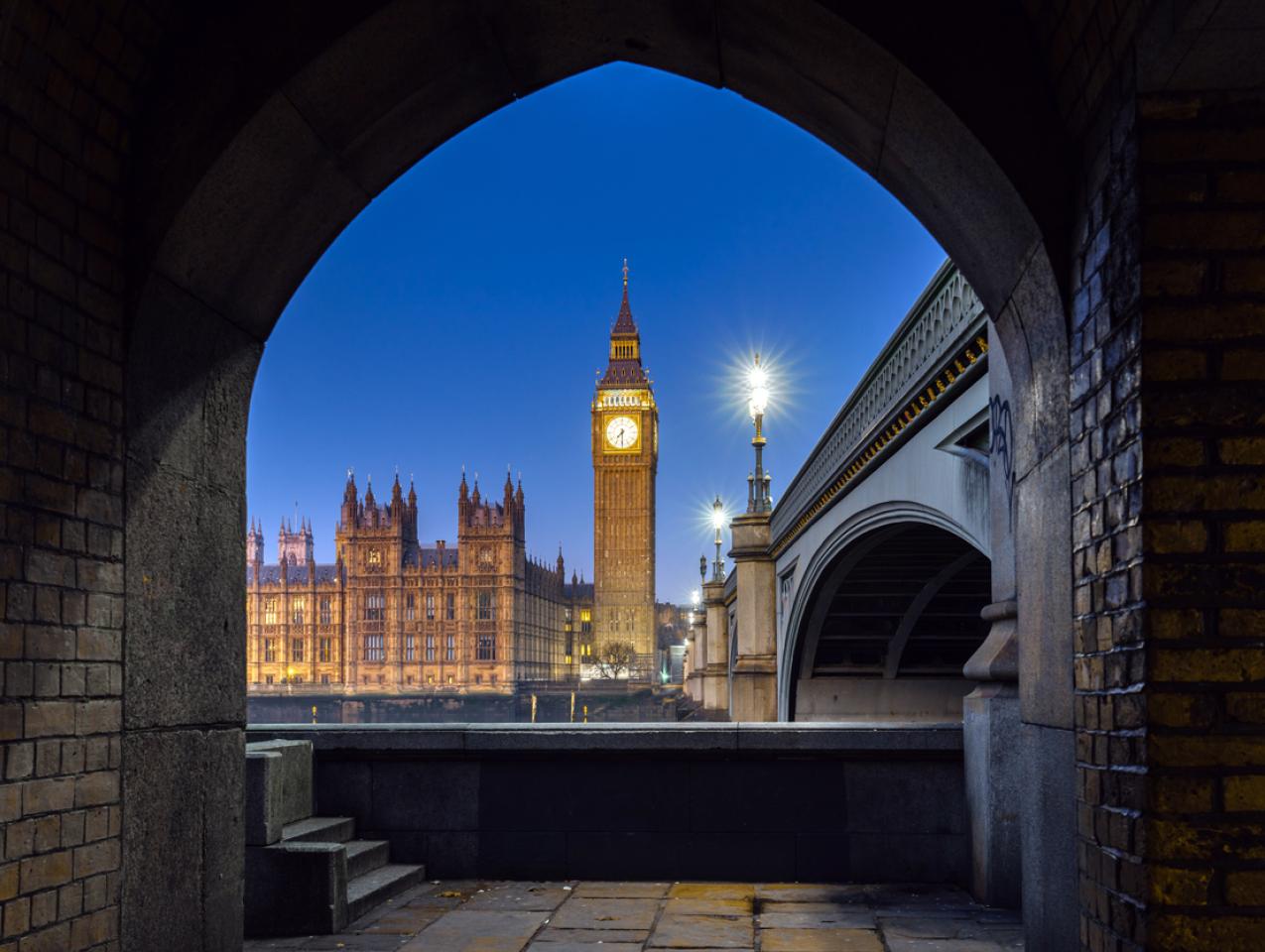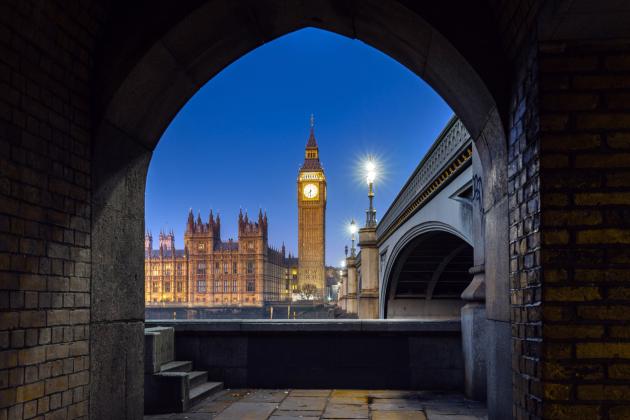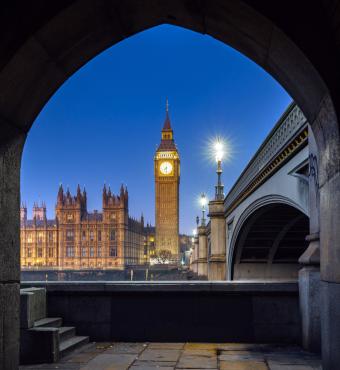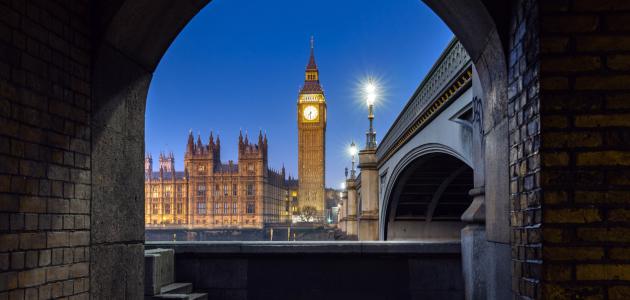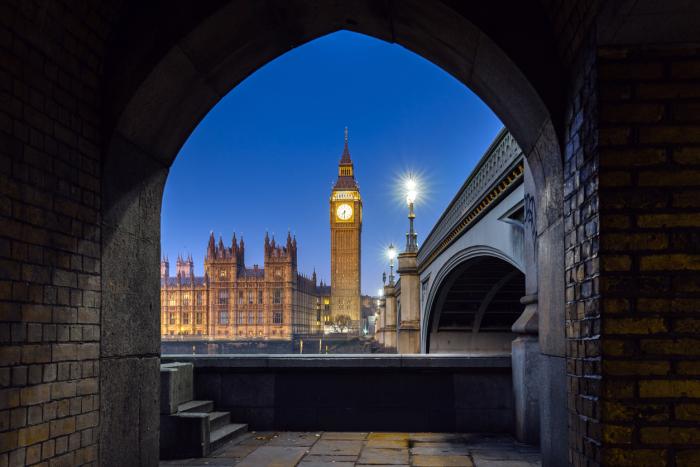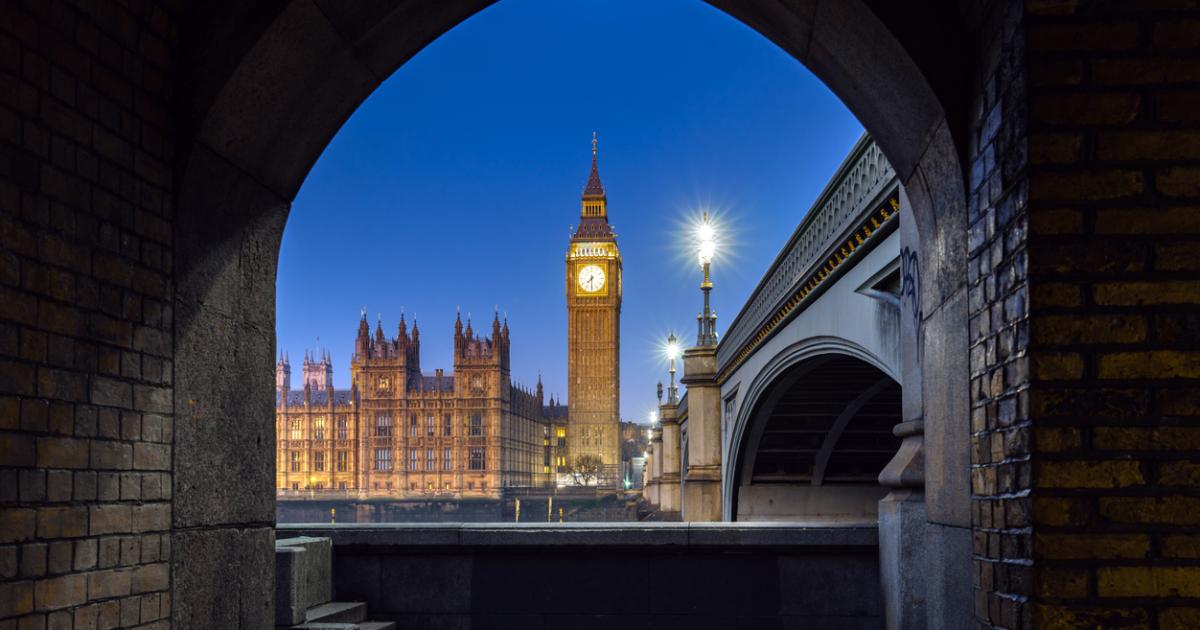As noted in my previous articles in Plum Lines, the Wodehouse canon reveals itself to be a veritable cornucopia of political and governmental facts and allusions, contrary to his apolitical reputation. Some play a large role and are crucial to his plots, while others are throwaway lines. In both cases, Plum deliberately chose to use them, and all reflect his wide knowledge of domestic and international politics. When you “book your ticket for Market Blandings” or “step high, wide, and plentiful” with Uncle Fred, you can learn much—and laugh along the way—about political history, institutions, politicians, ideologies, elections, and more.
While politics and “all that rot” are no doubt serious business, we should thank Plum for helping us to keep a sense of humor about it. He also offers us the philosophy necessary to be, well, philosophical about all those “dashed, infernal, officious, meddling, muddling, fat-headed, interfering asses” in political life (“Ukridge’s Dog College”). As Uncle Fred said to the real Major Brabazon-Plank in Uncle Dynamite, “The only poor consolation I can offer you is that it will be all the same in another hundred years.”
In order to better appreciate Plum’s contribution to our political knowledge and sanity, this essay discusses many of his references to British politics and government. He sprinkled it into his novels and short stories throughout his life, and without acknowledging this dimension of his work, our understanding of Wodehouse is incomplete. This should deepen our regard for Plum as one of the great English political satirists. He may even deserve a spot in the literary pantheon near the likes of Anthony Trollope, John Galsworthy, Arnold Bennett, and other careful observers of British life in bygone eras.
Wodehouse himself is not beyond deceiving us about the political themes in his work. For example, the first chapter of Bill the Conqueror (1924) is titled “A Marriage Has Been Arranged,” but the initial discussion is all about government, specifically Sir George Pyke’s receipt of a peerage. I may not be current with romantic fiction, but I doubt recent such novels begin with a list of potential House of Lords titles.
Because Uncle Fred is one of my favorite characters, this essay includes references to Uncle Fred in the Springtime (1939), Uncle Dynamite (1948), Cocktail Time (1958), and Service with a Smile (1961). I also considered Uneasy Money (1916), Bill the Conqueror (1924), Money for Nothing (1928), Mulliner Nights (1933), The Luck of the Bodkins (1935), Joy in the Morning (1946), Do Butlers Burgle Banks? (1968), and The Girl in Blue (1970). They were not chosen by any scientific sampling methodology. Instead, these are just the books I read or reread over the last couple of years.
House of Lords
The first six pages of Service with a Smile are suffused with politics and government. The story begins with a dejected Lord Emsworth who must leave paradise in order to attend a State Opening of Parliament: “Though why Parliament could not get itself opened without his assistance he was at a loss to understand. A backwoods peer to end all backwoods peers, Lord Emsworth had a strong dislike for London.”
This is a real event that takes place after an election and otherwise about once a year. State openings take place in the House of Lords chamber, and the members in their magnificent robes provide an impressive backdrop. The event attracts many members who rarely participate in political life, and such absentee lords (who prefer their “rural seat” to the parliamentary estate) are indeed termed “backwoods peers.”
In a discussion of the Life Peerages Act of 1958, the U.K. Parliament website notes that “the problem of peers who attended very infrequently—known colloquially as backwoodsmen—was tackled. Those peers who either did not want or were unable to attend, could get leave of absence for the length of a parliamentary session.” If Lord Emsworth had been aware of such a provision, he may well have applied without delay.
The reluctance of many peers to set foot in the House of Lords is made clear by the following exchange between Lord Ickenham and Lord Emsworth, respectively:
“You don’t look your usual bonny self. Very testing, these Openings of Parliament. Usually I give them a miss, as no doubt you do. What brought you up today?”
“Connie insisted.”
We are also privy to the following:
Gloomily he took one last, lingering look at the Empress and pottered off, thinking, as so many others had thought before him, the ideal way of opening Parliament would be to put a bomb under it and press the button.
After this remarkable thought, with a “belted earl” expressing sympathy with the likes of gunpowder plotters, we hear the following exchange between Lady Constance and the morose Myra Schoonmaker:
“I have been seeing Lord Emsworth off. He’s going to London.”
“Yes, he told me. He didn’t seem very happy about it.”
“He wasn’t,” said Lady Constance, a grim look coming into her face. “But he must do his duty occasionally as a member of the House of Lords.”
The subsequent Drones Club conversation between Lord Ickenham and Pongo accurately notes the presence at the State Opening of the “four pursuivants, Rouge Croix, Bluemantle, Rouge Dragon and Portcullis, as they headed the procession.” The U.K. Parliament website states that the officers of the College of Arms play a key ceremonial role: “Heralds and Pursuivants lead the Order of Procession.”
Two of those are mentioned when Lord Ickenham describes his sartorial magnificence to Lord Emsworth:
“Just before the procession got under way, I heard Rouge Croix whisper to Bluemantle, ‘Don’t look now, but who’s that chap over there?’ and Bluemantle whispered back, ‘I haven’t the foggiest, but evidently some terrific swell.’”
Because the Lords is a political body, we might inquire about Emsworth’s partisan connections. During Plum’s lifetime, most peers held hereditary titles; a large majority was Tory. One exception was Plum’s distant cousin John Wodehouse, the 2nd Earl of Kimberley and the first Labour member of the House of Lords.
As a group, the “backwoods peers” had the reputation of reactionaries who rarely participated in political life. Lord Emsworth does not strike me as a reactionary. I doubt that Emsworth had many, if any, political thoughts. While Connie or the Tory whips might occasionally bustle him into the chamber to join the “not content” division (i.e., vote “no”) on a Liberal or Labour bill, I doubt he would have cared about the underlying legislation unless it involved agricultural life or animal husbandry. In addition, inheritance taxes do not seem to cloud Blandings in the way they worry other residents of the Wodehouse canon.
In Bill the Conqueror, politics is front and center, as we learn about the political importance of Sir George Pyke on the second page:
For the man behind the Mammoth does not see every one. His time is valuable, his sense of his own importance keen, and he is hedged about by a crowd of willing helpers whose chief duty is to ensure the respecting by casual callers of that motto of all great mean—KEEP OUT! This Means YOU! An army with banners would be halted on the threshold, and not even Cabinet Ministers may crash the gate.
We then encounter the great man writing a list of names, which we learn are possible titles, as he will soon be elevated to the House of Lords.
“Francie, old girl,” he cried, “what do you think? They’ve offered me a peerage!”…
“What a culmination for your splendid career!” …
“And who helped me build that career? ... Who suggested the How Many Pins Does The Prime Minister’s Hat Hold competition in Pyke’s Weekly when it was touch and go if it could turn the corner?” …
“I said, have you thought of a title yet?”…
“Well, you know, a title ought to have a bit of a ring. Look at some of the ones there are already—Beaverbrook—Stratheden—Leverhulme. Plenty of zip to them.”
This refers to three real titles and people.
As the following quotation indicates, there was a time when peerages passed down from father to son, before the addition of the above-mentioned life peerages. “You must not forget that eventually Roderick will have to succeed to whatever title you choose. We must not select anything which would seem ridiculous in connection with Roderick.”
The House of Lords also makes an appearance in Uncle Dynamite when Uncle Fred complains about the life of a younger son of the aristocracy. He first moans: “Do you know how they treat Hons, Sally? Like dogs. They have to go into dinner behind the Vice-Chancellor of the County Palatinate of Lancaster.”
That is a real judicial office, and while it might have been easy for Plum to invent a highfalutin’ title, he chose a real one. Uncle Fred then continues: “The only bit of sunshine in their lives is the privilege of being allowed to stand at the bar of the House of Lords during debates.”
Actually, the accurate phrase would be “to stand at the steps of the throne” rather than “bar,” but it is nevertheless remarkable that Wodehouse knew about this obscure privilege (albeit for older, not younger, sons). According to the U.K. Parliament website, “The Bar of the House marks the boundary of the Chamber beyond which guests and visitors may not pass when either House is at work.” Standing at that point would not therefore be a unique privilege for Hons. However, the article “Who Sits Where in the House of Lords” clarifies that “[t]he steps of the throne are often used by members who wish to listen to a debate but not participate. The right to sit on the steps and observe extends to others too, including . . . the eldest child (including adopted children) of a member.”
Parliamentary Elections
In a previous essay, I discussed how parliamentary campaigns serve as important background and plot points in multiple stories. I could only scratch the surface of this deep and recurring topic, however, so here are some additional episodes and details from the Uncle Fred saga.
In Uncle Dynamite, Parliamentary candidate Sir Aylmer Bostock expresses frustration to Lady Bostock about Bill Oakshott ducking a railway station reception:
“That’s not the worst of it. It has probably lost me hundreds of votes.”
“Oh, but, dear, why? It wasn’t your fault.”
“What does that matter? People don’t reason. The news of a fiasco like that flies all over the county. One man tells another. It gets about that I have been placed in a ridiculous position, and the voters lose confidence in me. And nothing to be done about it.”
Further in the story, Uncle Fred is not above a little political blackmail:
“I don’t want any lip from you, young Mugsy,” he said sternly. “Let me give you a word of warning. I see by the papers that you are about to stand for Parliament. Well, don’t forget that I could swing the voting against you pretty considerably, if I wanted to, by letting an idealistic electorate in on some of the shady secrets of your boyhood. You won’t like it, Mugsy, when questions about your boyhood are thundered at you from the body of the hall while you are outlining your views on the Tariff problem.”
In Cocktail Time, Uncle Fred and Sir Raymond Bastable discuss his potential political career:
“My dear fellow! It would be fatal. Jane was telling me the other day that you were going to stand for Parliament at . . . where was it? Whitechapel?”
“Bottleton East. Frampton is thinking of retiring, and there will be a by-election there next summer probably. I am expecting the nomination.”
“Well, then, think of the effect on the electorate of a letter to The Times. You know what the British voter is like. Let him learn that you have won the Derby or saved a golden-haired child from a burning building, and yours is the name he puts a cross against on his ballot paper, but tell him that somebody has knocked your topper off with a Brazil nut and his confidence in you is shaken. He purses his lips and asks himself if you are the right man to represent him in the mother of Parliaments. I don’t defend this attitude, I merely say it exists.”
It was Sir Raymond’s turn to muse, and having done so he was forced to admit that there was truth in this. Bottleton East, down Limehouse way, was one of those primitive communities where the native sons, largely recruited from the costermongering and leaning-up-against-the-walls-of-public-houses industries, have a primitive sense of humor and think things funny which are not funny at all. Picturing Bottleton East’s probable reaction on learning of the tragedy which had darkened his life, he winced so strongly that his hat fell off and got another dent in it.
The famous phrase “mother of Parliaments” was first used by the radical reformer John Bright in an 1865 speech about a new Reform Act. Bright actually said that “England is the mother of Parliaments,” which has a different meaning, but the shortened phrase is typically used to refer to the Parliament, not the nation.
Sir Raymond continues his electoral worries a few pages later:
Cocktail Time was unquestionably outspoken in one or two spots, particularly Chapter 13. A Raymond Bastable, revealed as the man behind Chapter 13 and in a somewhat lesser degree Chapters 10, 16, 20, 22 and 24, could never hope to receive the nomination for the impending election at Bottleton East. A prudish Conservative Committee would reject him with a shudder and seek for their candidate elsewhere.
This is indeed how candidates were chosen—not in an American-style “primary” election but through selection by a local constituency association (although often with input from the national party). While details varied by party and over time, no individuals looking for nomination or renomination wanted to alienate their local co-partisan busybodies.
Government and Politics
Parliament makes an appearance in less exalted company, specifically a conversation early in Uncle Dynamite between Pongo and “young Bean,” the maid. She wants her fiancé, Constable Potter, to resign from the force, and Pongo responds: “But what could he do if he resigned his portfolio? Not easy to find jobs nowadays.”
Potter is thereby likened to a member of Parliament who leaves government by resigning his ministerial appointment, which is a risky decision. Like Lord Randolph Churchill, those who resign their positions may never again return to high office.
I also found the following interspersed gems:
The stammering reception of the first reporter became a memory. At the end of two weeks she was talking to the Press with the easy nonchalance of a prominent politician, and coming back at notebook-bearing young men with words which they had to look up in the office Webster. (Mulliner Nights, “Best Seller”)
Mr. Pott sighed slightly, but it was plain that he did not intend to recede from his attitude of civil disobedience. (Uncle Fred in the Springtime)
“One puts on a bit of dog in office hours, to impress the customers. I dare say you have done the same thing yourself in the House of Lords.” (Uncle Fred in the Springtime)
The Duke’s decision, on receiving Lord Emsworth’s ultimatum regarding the Empress of Blandings, [was] to mobilize his nephew Ricky and plunge immediately into power politics. (Uncle Fred in the Springtime)
The grand tradition of country squires and retired colonels writing letters to The Times, complaining of everything from socialism to the “modern young woman,” is immortalized in The Girl in Blue (as well as referenced by Uncle Fred in his above-discussed warning to Sir Raymond Bastable): “Crispin’s study, in which so many generations of Scropes had written so many letters to The Times, was on the ground floor.”
In Do Butlers Burgle Banks?, Uncle Hugo, who turned out to be an embezzler for good causes, is compared to a student who stole from his schoolmates in order to appear to be generous with them:
“Little beast!”
“Not all all, Gussie. He was quite a good sort. We all liked him, even after the facts were disclosed. He’s a member of Parliament now.”
“He would be.”
Politicians
In “The Strange Disappearance of Mr. Buxton-Smythe,” (1901), we encounter the following alleged political fact:
The information concerning St. Asterisk’s was wedged in between a statement (extracted from “Useful Bits”) to the effect that Mr. Joseph Chamberlain never eats mushrooms, and a letter to the “Daily Telegraph” on the question “Are Hairpins Hygienic?”
Joseph Chamberlain was a self-made businessman, mayor, member of Parliament, and cabinet member. At the time of the story, he had been Colonial Secretary since 1895. First a Liberal and then a Liberal Unionist, he was an opponent of Irish Home Rule, a strong imperialist, and a protectionist. History also remembers him as the father of Prime Minister Neville Chamberlain, the proponent of appeasement.
Reflecting the changing party politics of the early twentieth century, the first Labour Party Prime Minister gets a mention in “Uncle Fred Flits By” (1935): “And so, or I am very much mistaken, would Ramsay MacDonald and Winston Churchill.”
The reference to MacDonald was quite contemporary, as he resigned as Prime Minister of the National Government in that year. This was his second time in that office, as he previously led the short-lived Labour minority government in 1924. At the time of publication, Winston Churchill was out of government but still in Parliament, writing his four-volume series on his ancestor the Duke of Marlborough.
In a previous essay, I noted a mention of William Gladstone, and here is another reference to “The People’s Bill” in Money for Nothing: “What did Gladstone say in ’88? You can fuel some of the people all the time, and you can fuel all the people some of the time, but you can’t fuel all the people all the time.”
These sentences humorously combine British and American politics. Gladstone is, of course, the great Liberal Party leader, while the quote is by Abraham Lincoln (although with “fool” instead of “fuel”).
Cocktail Time contains a variety of other political references. For example, Uncle Fred informs Johnny Pearce: “Many of our most eminent public men don’t play the trombone. Lord Beaverbrook, for one.”
In Joy in the Morning, Bertie Wooster says the following when threatened by his old schoolmate Cheesewright, who is now a jealous constable: “There are bigger fatheads than Stilton among our legislators—dozens of them. They would probably shove him in the Cabinet.”
Later in the novel, we see the following exchange when Bertie tries to convince Uncle Percy that Boko would be a suitable husband for Nobby:
“He is one of the hottest of England’s young littérateurs. He earns more per annum than a Cabinet Minister.”
“He ought to be ashamed of himself, if he didn’t. Have you ever met a Cabinet Minister? I know dozens, and not one of them that wouldn’t be grossly overpaid at thirty shillings a week.”
But Wait, There’s More
Right before Sir Raymond’s hat is knocked off by a Brazil nut in Cocktail Time, we learn about his impatient nature: “When he wanted a taxi-cab, ten thousand must have sprung from their ranks to serve him.” It may be an echo of Edmund Burke’s comments on the death of Marie Antoinette in Reflections on the Revolution in France (1790): “I thought ten thousand swords must have leaped from their scabbards to avenge even a look that threatened her with insult.”
In the same book, Uncle Fred converses with Oily Carlisle, “who had found a ruby ring in the street and was anxious to sell it, the darned thing being of no use to him”: “Some time ago my wife, who believes in a strong, centralized government, decided to take over the family finances.” He had used the same excuse in Uncle Fred in the Springtime: “My wife, I should mention, is a woman who believes in a strong centralized government.”
The words spoken between Uncle Fred and Sir Raymond no doubt perfectly express Plum’s own view:
“But aren’t you forgetting something? How about your political career?”
“Damn my political career! I don’t want a political career, I want a hundred and fifty thousand dollars.”
In Uncle Dynamite, we learn about the sometimes raucous nature of British politics. We read that “Sir Aylmer drew a deep breath like a speaker at a public meeting after the hecklers have been ejected.”
In Service with a Smile, Uncle Fred attempts to reassure Lord Emsworth that Lady Constance will not be able to prove that he cut the ropes of the Boy Scout tents. She may have suspicions, but “she knows perfectly well that there is none that would have a hope of getting past the Director of Public Prosecutions.”
How appropriate that we read those lines today, as the recently elected prime minister is none other than a former Director of Public Prosecutions, Sir Keir Starmer, who held that office from 2008 to 2013.
Conclusion
Far from an idealized world in which the mischief and malarkey of government and politics do not intrude, we often find it at the center of Plum’s writing. We should acknowledge this as part of his genius rather than closing our eyes and putting our fingers in our ears when politics is mentioned. Ignoring politicians does not make them go away, but mocking the “fatheads” and “gaggle of freaks and sub-humans” in government is a time-honored tradition that is “just the stuff to give the troops.”
This essay is reprinted with permission from Plum Lines: The Quarterly Journal of The Wodehouse Society







